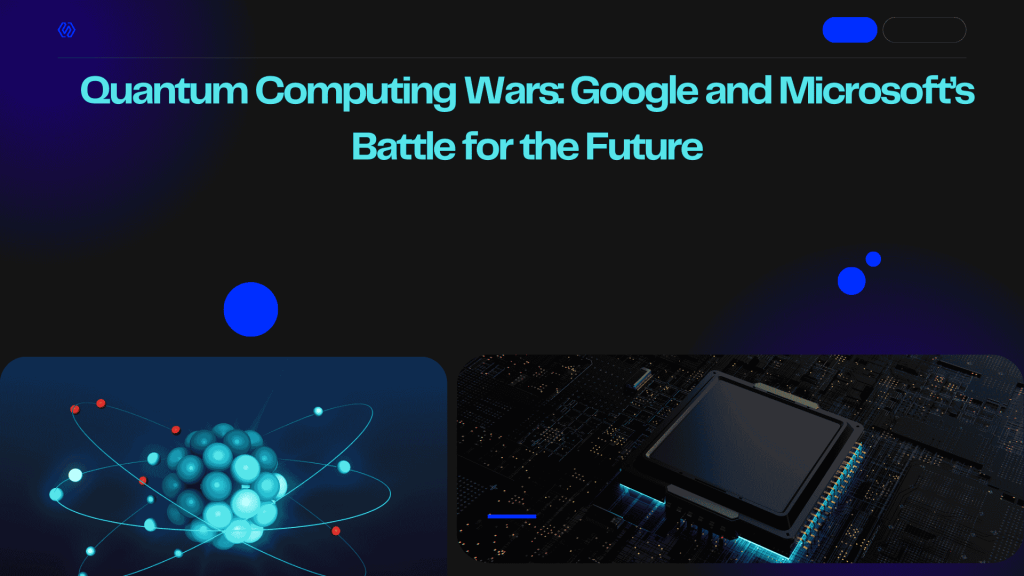Table of Contents
ToggleQuantum Computing Wars: Google and Microsoft’s Battle for the Future
The Quantum Computing Race is heating up, and two tech giants, Google and Microsoft, are at the forefront of this revolutionary battle. As they compete to achieve quantum supremacy, the stakes are higher than ever. This isn’t just a competition for bragging rights; it’s a fight to shape the Future of Quantum Technology and redefine computing as we know it. In this post, we’ll dive deep into the Google vs Microsoft Quantum rivalry, explore their breakthroughs, and examine what this means for the future of technology.
What is Quantum Computing, and Why Does It Matter?
Before we delve into the Quantum Computing Race, let’s first understand what quantum computing is and why it’s such a big deal. Traditional computers rely on bits, which can be either 0 or 1. Quantum computers, on the other hand, use quantum bits or qubits, which can exist in multiple states simultaneously thanks to the principles of superposition and entanglement. This allows quantum computers to solve complex problems exponentially faster than classical computers.

The implications are enormous. From revolutionizing drug discovery and cryptography to optimizing supply chains and advancing artificial intelligence, quantum computing has the potential to transform industries across the board. This is why the Future of Quantum Technology is so critical, and why companies like Google and Microsoft are investing billions to lead the charge.
The Quantum Computing Race: A Brief Overview
The Quantum Computing Race began in earnest in the early 2010s, as tech companies and research institutions started to recognize the transformative potential of quantum technology. Google and Microsoft quickly emerged as key players, each taking a different approach to achieving quantum supremacy.
Google made headlines in 2019 when it claimed to have achieved quantum supremacy with its Sycamore processor. The company announced that Sycamore had performed a calculation in 200 seconds that would have taken the world’s fastest supercomputer 10,000 years to complete. This was a monumental milestone in the Quantum Supremacy Battle, but Microsoft was quick to challenge Google’s claims.
Now, Google is pushing the envelope further with its next-generation quantum processor, Willow. Designed to be more cost-effective and scalable, Willow represents Google’s commitment to making quantum computing more accessible. Meanwhile, Microsoft is focusing on Majorana 1, exotic particles that could form the basis of more stable qubits. While Microsoft hasn’t yet achieved quantum supremacy, its work on Majorana-based qubits has positioned it as a serious contender in the Google vs Microsoft Quantum battle
Google vs Microsoft Quantum: Key Breakthroughs and Strategies
Google’s Willow Processor
Google’s Willow processor is the latest addition to its quantum computing arsenal. Building on the success of Sycamore, Willow is designed to be more cost-effective and scalable, addressing one of the biggest challenges in the Quantum Computing Race: making quantum technology accessible to a wider audience. Willow’s architecture focuses on reducing errors and improving qubit stability, which are critical for practical applications.
Google’s strategy revolves around building noisy intermediate-scale quantum (NISQ) computers, which are not yet error-free but are powerful enough to perform specific tasks. With Willow, Google aims to accelerate the development of quantum algorithms and bring quantum computing closer to real-world applications in fields like healthcare, finance, and logistics.
Microsoft’s Majorana 1
Microsoft’s approach to the Quantum Computing Race is fundamentally different. Instead of focusing on traditional qubits, the company is developing qubits based on Majorana 1, exotic particles that are theoretically more stable and less prone to errors. This approach could give Microsoft a significant advantage in building scalable and reliable quantum systems.
While Microsoft hasn’t yet achieved quantum supremacy, its work on Majorana-based qubits represents a bold and innovative direction in the Quantum Supremacy Battle. The company is also integrating its quantum research with its Azure cloud platform, making quantum technology more accessible to businesses and researchers.
The Future of Quantum Technology: What’s at Stake?
The Future of Quantum Technology hinges on the outcome of the Google vs Microsoft Quantum battle. Both companies are pushing the boundaries of what’s possible, but their approaches reflect different visions for the future.
Google’s Willow processor and its focus on cost-effectiveness and scalability could accelerate the adoption of quantum computing in industries like healthcare, finance, and logistics. On the other hand, Microsoft’s work on Majorana 1 and its emphasis on stability and reliability could make quantum computing more robust and accessible, paving the way for widespread commercialization.
The Quantum Computing Race isn’t just about who gets there first; it’s about who can create a quantum computer that is both powerful and practical. The winner of this race will not only gain a competitive edge but will also shape the Future of Quantum Technology for decades to come.
The Quantum Supremacy Battle: A Closer Look
The Quantum Supremacy Battle is a key aspect of the Quantum Computing Race. Quantum supremacy refers to the point at which a quantum computer can perform a calculation that is impossible for a classical computer to solve in a reasonable amount of time. Google’s Sycamore processor was the first to claim this milestone, but the debate over what constitutes true quantum supremacy continues.
Critics argue that the calculations performed by Sycamore were highly specialized and not yet applicable to real-world problems. However, Google’s achievement was a significant step forward in the Quantum Supremacy Battle, demonstrating the potential of quantum computing to outperform classical systems.
Microsoft, on the other hand, is taking a longer-term approach. By focusing on Majorana 1, the company aims to build a quantum computer that is not only powerful but also stable and scalable. While Microsoft hasn’t yet achieved quantum supremacy, its work could ultimately lead to a more practical and reliable quantum system.
Next-Gen Computing Wars Beyond Quantum Supremacy
The Next-Gen Computing Wars extend beyond the Quantum Supremacy Battle. As Google and Microsoft compete to lead the Quantum Computing Race, they are also shaping the future of computing as a whole. Quantum computing is just one piece of the puzzle; the integration of quantum technology with classical systems, artificial intelligence, and cloud computing will define the next generation of computing.
Google’s Willow processor and Microsoft’s Majorana represent two different visions for the future of computing. Google’s focus on cost-effectiveness and scalability could make quantum computing more accessible to businesses and researchers, while Microsoft’s emphasis on stability and reliability could lead to more robust and practical quantum systems.
The Next-Gen Computing Wars are not just about quantum computing; they are about redefining the boundaries of what is possible with technology. The winner of this battle will not only lead the Quantum Computing Race but will also shape the future of computing for decades to come.

Challenges in the Quantum Computing Race
Despite the progress made by Google and Microsoft, the Quantum Computing Race is far from over. Both companies face significant challenges, including
- Error Correction: Quantum computers are highly susceptible to errors due to environmental interference. Developing effective error-correction techniques is crucial for building reliable quantum systems.
- Scalability: Current quantum computers, including Google’s Willow and Microsoft’s Majorana-based systems, are limited in size and power. Scaling up quantum systems to handle more complex problems is a major hurdle.
- Accessibility: Making quantum computing accessible to businesses and researchers is essential for driving innovation. Both Google and Microsoft are working on cloud-based quantum platforms to address this challenge.
- Algorithm Development and Practical Applications: While quantum hardware is advancing, the development of efficient quantum algorithms that can outperform classical algorithms for real-world problems remains a significant challenge. Many quantum algorithms, such as Shor’s algorithm for factoring and Grover’s algorithm for search, demonstrate theoretical advantages, but practical applications in fields like cryptography, optimization, and material science are still in their infancy. Bridging the gap between theoretical potential and practical, impactful use cases is essential for quantum computing to deliver on its promises. Both Google and Microsoft are investing in research to identify and develop algorithms that can leverage quantum advantage in meaningful ways.
Conclusion: Who Will Win the Quantum Computing Wars?
The Quantum Computing Wars between Google and Microsoft are more than just a corporate rivalry; they represent a pivotal moment in the history of technology. As these two giants compete to lead the Quantum Computing Race, they are also shaping the Future of Quantum Technology.
While Google has made significant strides with its Willow processor and its focus on cost-effectiveness and scalability, Microsoft’s work on Majorana 1 and its emphasis on stability could give it a long-term advantage. Ultimately, the winner of this battle will be the one who can overcome the technical challenges and deliver a quantum computer that is both powerful and practical.
As we look to the future, one thing is clear: the Quantum Computing Wars are just beginning, and the stakes couldn’t be higher. Whether it’s Google or Microsoft that comes out on top, the real winner will be humanity, as quantum computing unlocks new possibilities and transforms the world as we know it.
- The Future of PS5 with AI: How Artificial Intelligence is Revolutionizing Gaming and Redefining Next-Gen Gaming Technology
- How to Rank Your Business on Google Maps in the USA #1
World Capital of AI and Crypto USA: The Era of Innovation and Market Impact 2025
- How Digital Marketing Can Transform Small Businesses in the USA
- Common SEO Issues and Solutions USA
- India Based Digital Services for USA Clients
- Common Web Design Errors USA
- Mobile First Website Design
- Digital Marketing Challenges for USA Businesses




it’s Fantastic and very deep information